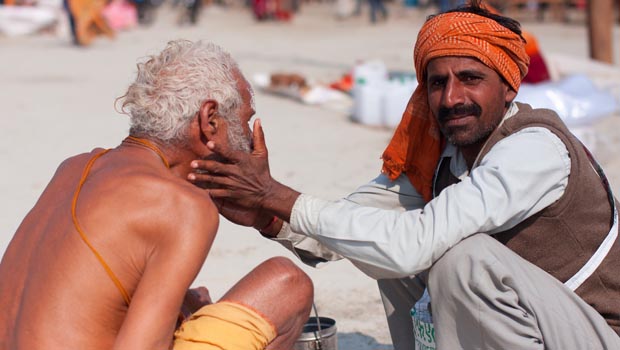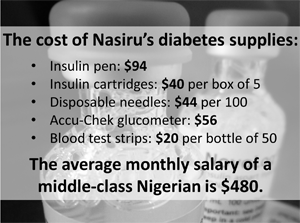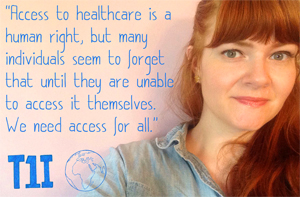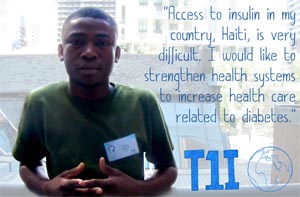Global Portraits of Type 1 Diabetes

Life with Type 1 diabetes is challenging for anyone, but more so for those who must manage the condition in resource-poor areas of the world. People living with diabetes in these settings face multiple challenges, such as the unaffordability of insulin, lack of access to care and diabetes education, political strife, and more.
The excerpts below are from interviews on T1international.com of people with Type 1 in the developing world. They paint a picture – at least in part – of the challenges they face everyday. They also present the opportunity for the diabetes community to work together – using its collective compassion, determination, creativity and skill – to find sustainable solutions for the global T1D community.
Olafimihan Nasiru, a member of the Nigerian diabetes online community, shared his difficult story:
 Having to depend on insulin has brought a financial burden on me, especially now that I am without work. It has become necessary for me to secure all the medications and materials I need on my own. Additionally, the myths associated to diabetes in Africa, mostly due to ignorance, have not helped encourage me to typically disclose my diabetic status to people. For instance, I have gotten…advice ranging from direction to seek a spiritual cure to suggestion to abandon my insulin injections, with no logical alternative provided.
Having to depend on insulin has brought a financial burden on me, especially now that I am without work. It has become necessary for me to secure all the medications and materials I need on my own. Additionally, the myths associated to diabetes in Africa, mostly due to ignorance, have not helped encourage me to typically disclose my diabetic status to people. For instance, I have gotten…advice ranging from direction to seek a spiritual cure to suggestion to abandon my insulin injections, with no logical alternative provided.
Erin Little is the founder of Sucre Blue, an organization that trains community health workers in Bangalore, India. She shared her insights about diabetes in India.
 It is crazy to think that even now the oldest diabetic living with diabetes in India is 65. She is famous and seen as a success story, although in other parts of the world diabetics live much longer. In India, most diabetics cannot afford Lantus and Humalog so they are on regular insulin which is still too expensive. Most people do not have insurance. I feel like I’ve dealt with access and affordability in the states, but it was so shocking to see diabetics working against so many different issues. No one has the money for blood strips, so most of the patients I worked with in India show up and have no blood glucose numbers. The doctors can give them a check-up, but you can’t really guide someone’s regimen that well if there is no affordability and no education.
It is crazy to think that even now the oldest diabetic living with diabetes in India is 65. She is famous and seen as a success story, although in other parts of the world diabetics live much longer. In India, most diabetics cannot afford Lantus and Humalog so they are on regular insulin which is still too expensive. Most people do not have insurance. I feel like I’ve dealt with access and affordability in the states, but it was so shocking to see diabetics working against so many different issues. No one has the money for blood strips, so most of the patients I worked with in India show up and have no blood glucose numbers. The doctors can give them a check-up, but you can’t really guide someone’s regimen that well if there is no affordability and no education.
Widney Dorce is a young person with Type 1 diabetes from Haiti. He hopes to help establish diabetes education centers and to strengthen access to health care for people with diabetes in his country.
 The healthcare system is working badly. The medical facilities are difficult to find, because there isn’t much that has been invested in the domain. Materials and supplies to control our blood sugar, as well as visits to the physician for medical supplies, are also costly. Access to insulin for the Type 1 diabetics is another big problem because it is very expensive. Getting access to insulin is one thing, storing it is another. Non-access to insulin and supplies often results in death among the Type 1 group. Sometimes Type 1 diabetics who can’t afford their insulin and supplies just turn to traditional medicines. They use tree bark, aloe, bitter coffee, and so on. Of course these cannot treat diabetes.
The healthcare system is working badly. The medical facilities are difficult to find, because there isn’t much that has been invested in the domain. Materials and supplies to control our blood sugar, as well as visits to the physician for medical supplies, are also costly. Access to insulin for the Type 1 diabetics is another big problem because it is very expensive. Getting access to insulin is one thing, storing it is another. Non-access to insulin and supplies often results in death among the Type 1 group. Sometimes Type 1 diabetics who can’t afford their insulin and supplies just turn to traditional medicines. They use tree bark, aloe, bitter coffee, and so on. Of course these cannot treat diabetes.
This World Diabetes Day, the diabetes community can work together towards the goal of ensuring that everyone has the right to stay healthy with Type 1. You also can take action by submitting your photo in support of the insulin4all campaign at www.insulin4all.tumblr.com. The campaign, a partnership of The Pendsey Trust and T1International, aims to ensure that the entire world is remembered on World Diabetes Day.
Lead Image: Radiokafka / Shutterstock.com
Thanks for reading this Insulin Nation article. Want more Type 1 news? Subscribe here.
Have Type 2 diabetes or know someone who does? Try Type 2 Nation, our sister publication.







